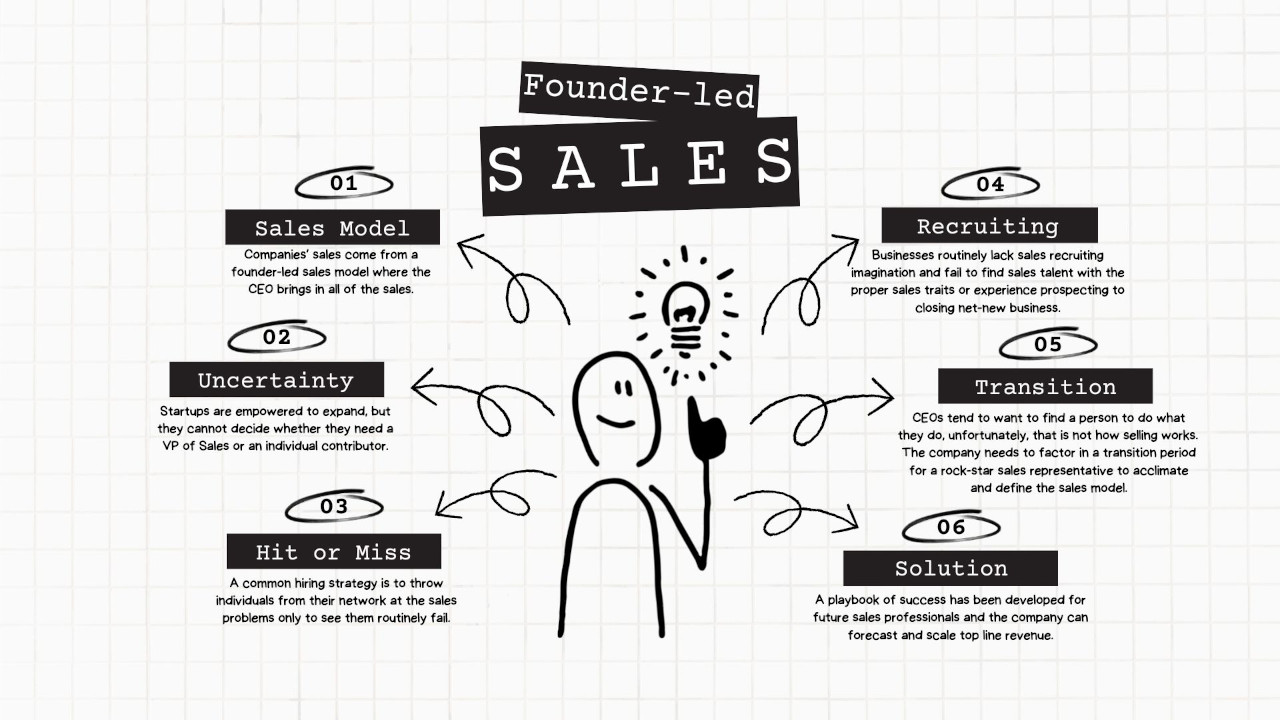How Do Companies Scale Sales Teams When the CEO Is Also the Top Salesperson?
We represent thousands of companies at Treeline. While their sizes, industries and org charts vary, many of our clients are referred to us by Venture Capital and Private Equity firms because we have built a “Sales Hiring Playbook” to help their portfolio companies grow their sales teams. From the Chief Revenue Officer to the Individual Sellers and front-line Business Development Representatives, we know how to help these outfits expand properly.
When we speak with many of these startups, they have enjoyed initial growth, but they struggle to scale up. Often, these companies’ sales come from a founder-led sales model where the CEO, Co-Founders or other C-level executives are bringing in all sales. We find that many of these businesses try to hire talented sales professionals, but they fail.
So, let’s talk about what they get wrong to help you do it right.
Commonly, Companies Are Confused
Typically, startups are empowered to expand, but they cannot decide whether they need a VP of Sales or an individual contributor.
Suppose you asked your colleagues, “Who does our company need in place to help us grow?” You would surely encounter a wide array of opinions ultimately leading to confusion, not clarity. Guided by your organization’s size and structure, you can carefully determine your answer to that question yourself.
Of course, once you clearly define your candidate, you have to find the right fit.
Hit-or-Miss Hiring Strategies Are Popular, but They Usually Miss
We run into this all the time. Companies’ in-house recruiters reach out through their confined networks. Small startups often try leaning into people they happen to know. These scenarios lead to organizations repeatedly hiring:
- The best person to whom they have been coincidentally introduced
- Not necessarily a great sales professional
- Frankly, the wrong person for the job
As a result, companies who employ this common hiring strategy throw individuals at their problems only to see them routinely fail.
Principally, they fail because nobody at the company has defined any success metrics around bringing a sale from a cold call to a closed deal. Without this systematic approach to the current selling environment, a new hire cannot sell like the CEO. In many cases, the CEO doesn’t even know how they sell, so they are not prepared to hire, train or coach a new salesperson.
A company must understand its:
- Target audience
- Lead buyer personas
- Lead time
- Optimal sale size
- Current sales cycle
- Quota for a new rep’s defined territory or market
- Other metrics unique to its niche
Your organization’s CEO should thoroughly consider and define these metrics. If they do not have all of the answers, they should hire an expert to help them figure it out. Certainly, this takes time and effort, but it’s a great first step toward understanding the sales process and forecasting revenue.
Without this information, it is very difficult to appreciate the key selling characteristics of an individual contributor who can be successful in your organization.
Businesses Routinely Lack Sales Recruiting Imagination
A company must take the time to envision the right type of person to be their first rep. We urge you to weigh
- The size of the company a person has sold for in the past
- A candidate’s entrepreneurial flair, which is critical in startup scenarios
- Your new rep’s personality traits
It’s important to hire someone who does not need hand holding when it comes to prospecting and closing net-new business.
Managers Forgo Plans
Typically, we find organizations’ sales reps cannot succeed as a group because no agreed-upon sales model or goals exist. You see, when hiring a new rep, it is crucial that your interview process include a conversation about a 30, 60 and 90-day plan. The person you want to bring in must make new sales, so ask them about their vision for their role at your company and where they would start.
Ask these questions:
- How do you see yourself operating on our organization’s behalf in the first quarter you’re here?
- How will you positively enhance our trajectory?
- What will your goals be in your first 30 days?
- What sales targets will you plan to achieve in the first 60 days?
- And how about the first 90 days?
- What support will you need from our existing team to make these goals realistic?
This interaction helps both parties develop a sales strategy and gives the salesperson and the company some agreed-upon metrics for accountability.
At the end of each month, both parties can look at what has been accomplished to make sure they are on track and report the findings to ensure a systematic approach to sales is being built. Importantly, your ideal hire is a doer because a person who is only focused on process and not proof will never deliver.
Without accountability, the CEO and other decision makers can get frustrated by a lack of clarity about what is happening. Subsequently, the CEO feels they’ve set money ablaze for an individual who provides no benefit to the company.
Expectations Are Poorly Set
Often, a CEO just wants to find a person who can do what they do, close new business! Unfortunately, that is not how selling works. You don’t just throw a person at a problem that nobody has solved.
You can find a rock-star rep to take over for the CEO, but you must factor in a transition period. Set realistic expectations for new reps throughout your organization. After all, it takes time to
- Distill your CEO’s knowledge about your unique business niche
- Train your new rep
- Develop leads
- Develop proposals
- Close deals
A properly trained representative will have the skills to hunt for new business in your curated market. Their experience over the next few quarters will critically impact your organization’s capacity to scale. They are, after all, the first sales rep to come aboard after your CEO, and they will figure out how your company’s sales process actually works:
- How do they reach out to your market?
- How do they introduce themselves?
- How do they get your company on the map?
Remember, it takes time to learn:
- How many weekly cold calls and social connections lead to an appointment?
- What number of appointments leads to a proposal?
- How many proposals are required to get a signed contract?
- What’s the average signed contract’s value?
- How long does the average deal take to close?
Obviously, this data cannot be collected overnight but once you have this information, the averages of all those activities and deal sizes will reveal a systematic approach to winning new business, and you’ll be able to establish realistic revenue targets.
If you invest this time and effort, your company can reliably scale its sales team.
Sales Has No Defined Quota to Hit
The CEO should have a quota or a revenue budget defined. A quota is the revenue amount that this individual needs to hit to pay for themselves and grow the company. You determine it using the average deal size in your sales cycle. After you know that size, you can estimate the number of deals your new rep should close monthly, quarterly and annually.
Share this information with the seller to help them figure out what activity it takes to achieve this quota.
For example, if you set your quota at $750,000 and your average deal size is $62,500, the rep knows they need to close 12 deals in one year to meet the goal. From there, they can start to estimate the number of cold calls, emails, demos, proposals and other metrics needed to close their 12 deals.
Now, you are developing a playbook of success for future sales professionals. You can hire a second person that aligns with the selling characteristics of this environment. You can give them the activity metrics required to hit a $750,000 quota and hold them accountable. Now, you can train each new seller with a $750,000 revenue target in mind. Hire two more people, and add an additional $1.5 million to your top line.
People Often Forget to Properly Compensate High-Quality Work
Remember to pay enough to sustain your top salesperson. If you pay a competitive salary and receive no new business though the salesperson is obviously doing an excellent job, take our advice. Pay them accordingly, and help them through this discovery phase; many companies implement some sort of MBO strategy to compensate them on activity and pipeline vs. closed revenue for a set period of time. Then, with the data collected, work toward a new, fair compensation plan after 12 months. If you don’t pay them competitively, they will leave and you will be forced to start over again from scratch.
If you are both the CEO and top salesperson at a company struggling to add reps you trust, we bet you have experienced some of these pitfalls. The CEO must work on the business at least as much as they work in the business and cannot compare themself to their sales team. As the CEO, you have it easy when selling because you have the network and the referrals. A no-name salesperson without a CEO title has to do the heavy lifting, the cold calling and introductions to get their foot in the door. That’s a challenging task. To overcome that challenge and scale your sales properly, you must develop an executive search plan to hire one person who will succeed at proving your sales model, quota and metrics. Once those are proven, you can duplicate your new rep’s efforts by hiring other talented professionals.
So, if you’re a selling CEO who’s trying to grow your company and has run into some of these challenges, we hope you can view your organization’s potential from a different perspective now. Reach out to us at Treeline, Inc. if you need assistance from a team of executive search recruiters with 22 years of professional sales recruiting expertise.
Share This Story, Choose Your Platform!
What our happy clients are saying
Let Us Help You Source the Sales Talent You Need
Whether you’re building a team or replacing a key role, our Candidate Sourcing Platform provides a fast, flexible, and employer-focused solution.
Tell us more about your business and how we can help.
Treeline Inc.
Your Award-Winning Sales Recruitment Partner
15 Lincoln Street, Suite 314, Wakefield, MA 01880












